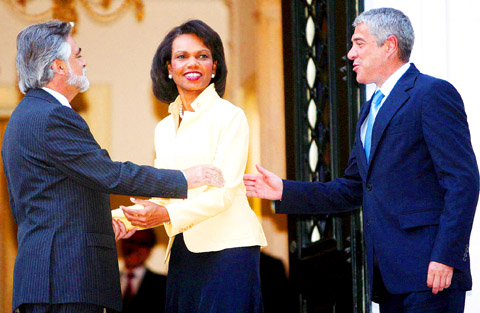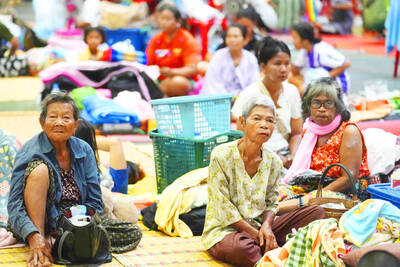When US Secretary of State Condoleezza Rice spends a few hours in Libya and shakes hands with Libyan leader Muammar Qaddafi, she will close a nearly three-decade era of bitter animosity between the US and the North African nation that has sometimes gotten personal.
It’s not every day that a US president calls a foreign leader a “mad dog.”
As the first secretary of state to visit the country in more than a half-century, Rice’s visit yesterday will represent a foreign policy success for the Bush administration.

PHOTO: EPA
“It is a historic moment and it is one that has come after a lot of difficulty, the suffering of many people that will never be forgotten or assuaged, a lot of Americans in particular. It is also the case that this comes out of a historic decision that Libya made to give up weapons of mass destruction and renounce terrorism. I am very much looking forward to it,” Rice said yesterday at a news conference in Lisbon.
“Libya,” she said, “is a place that is changing and I want to discuss how that change is taking place.”
Yet relations between the two countries still will face strains on a number of fronts, ranging from human rights to the final resolution of legal claims from 1980s terror bombings.
Despite Qaddafi’s 2003 decision to abandon weapons of mass destruction, renounce terrorism and compensate victims of the 1986 La Belle disco bombing in Berlin and the 1988 Pan Am 103 bombing over Lockerbie, Scotland, not all questions have been settled.
Even as Rice prepared for her landmark face-to-face meeting with Qaddafi, whom the late president Ronald Reagan once called the “mad dog of the Middle East,” a fund set up last month to compensate US and Libyan victims of those bombings remained empty.
A leading reformer, Fathi al-Jhami, whose case has been championed by the Bush administration, remained in detention, where he has been near continuously since 2002. Rights groups say hundreds of other political prisoners are still being held.
Among the biggest question marks is the often unpredictable behavior of Qaddafi, who has cultivated images as both an Arab potentate and African monarch since taking power in a 1969 coup. By all accounts it will be a meeting to remember.
In an interview with al-Jazeera TV last year, Qaddafi spoke of Rice in most unusual terms, calling her “Leezza” and suggesting that she actually runs the Arab world with which he has had severe differences in the past.
“I support my darling black African woman,” he said. “I admire and am very proud of the way she leans back and gives orders to the Arab leaders ... Leezza, Leezza, Leezza ... I love her very much. I admire her, and I’m proud of her, because she’s a black woman of African origin.”
Rice will be the first secretary of state to visit Libya since John Foster Dulles in 1953 and the highest-ranking US official to visit since then vice president Richard Nixon in 1957.

FOREST SITE: A rescue helicopter spotted the burning fuselage of the plane in a forested area, with rescue personnel saying they saw no evidence of survivors A passenger plane carrying nearly 50 people crashed yesterday in a remote spot in Russia’s far eastern region of Amur, with no immediate signs of survivors, authorities said. The aircraft, a twin-propeller Antonov-24 operated by Angara Airlines, was headed to the town of Tynda from the city of Blagoveshchensk when it disappeared from radar at about 1pm. A rescue helicopter later spotted the burning fuselage of the plane on a forested mountain slope about 16km from Tynda. Videos published by Russian investigators showed what appeared to be columns of smoke billowing from the wreckage of the plane in a dense, forested area. Rescuers in

POLITICAL PATRIARCHS: Recent clashes between Thailand and Cambodia are driven by an escalating feud between rival political families, analysts say The dispute over Thailand and Cambodia’s contested border, which dates back more than a century to disagreements over colonial-era maps, has broken into conflict before. However, the most recent clashes, which erupted on Thursday, have been fueled by another factor: a bitter feud between two powerful political patriarchs. Cambodian Senate President and former prime minister Hun Sen, 72, and former Thai prime minister Thaksin Shinawatra, 76, were once such close friends that they reportedly called one another brothers. Hun Sen has, over the years, supported Thaksin’s family during their long-running power struggle with Thailand’s military. Thaksin and his sister Yingluck stayed

‘ARBITRARY’ CASE: Former DR Congo president Joseph Kabila has maintained his innocence and called the country’s courts an instrument of oppression Former Democratic Republic of the Congo (DR Congo) president Joseph Kabila went on trial in absentia on Friday on charges including treason over alleged support for Rwanda-backed militants, an AFP reporter at the court said. Kabila, who has lived outside the DR Congo for two years, stands accused at a military court of plotting to overthrow the government of Congolese President Felix Tshisekedi — a charge that could yield a death sentence. He also faces charges including homicide, torture and rape linked to the anti-government force M23, the charge sheet said. Other charges include “taking part in an insurrection movement,” “crime against the

POINTING FINGERS: The two countries have accused each other of firing first, with Bangkok accusing Phnom Penh of targeting civilian infrastructure, including a hospital Thai acting Prime Minister Phumtham Wechayachai yesterday warned that cross-border clashes with Cambodia that have uprooted more than 130,000 people “could develop into war,” as the countries traded deadly strikes for a second day. A long-running border dispute erupted into intense fighting with jets, artillery, tanks and ground troops on Thursday, and the UN Security Council was set to hold an emergency meeting on the crisis yesterday. A steady thump of artillery strikes could be heard from the Cambodian side of the border, where the province of Oddar Meanchey reported that one civilian — a 70-year-old man — had been killed and